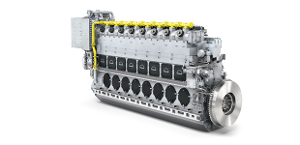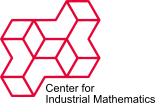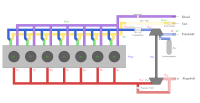HERCULES-2
| Working Group: | WG Optimization and Optimal Control |
| Leadership: |
Prof. Dr. Christof Büskens ((0421) 218-63861, E-Mail: bueskens@math.uni-bremen.de )
Dr.-Ing. Mitja Echim (E-Mail: mitja.echim@topas.tech) |
| Processor: | Dr.-Ing. Friedrich Kohlmai |
| Funding: | EU - Horizon 2020 |
| Project partner: |
MAN Energy Solutions, Augsburg Universität Wien |
| Time period: | 01.05.2015 - 31.10.2018 |
| Website: | http://www.hercules-2.com |

Worldwide shipping plays a decisive role in global trade. The ships used for this purpose in the range of 1000 kW to 85000 kW are almost completely (approx. 99%) powered by diesel engines. The further development of such powerful engines is therefore a very important task. The central questions have always been
- to guarantee the reliability of the engines,
- to ensure low fuel consumption
- as well as to reduce pollutant emissions (only since the year 2000).
The project "Fuel flexible, near-zero emissions adaptive performance marine engine", or HERCULES-2 for short, has set itself the goal of scientifically addressing and answering these central questions with an international consortium of 35 partners from 11 countries, led by the world's two leading marine engine manufacturers MAN and Wartsila. The working group Optimization and Optimal Control participated in this forward-looking research project. Together with the Institute for Vehicle Drives and Automotive Engineering at the Vienna University of Technology and the industrial partner MAN Diesel & Turbo SE in Augsburg, the optimizers worked this project for 3 years.
The research group Optimization and Optimal Control was primarily concerned with the dynamic modeling of ship engines, nonlinear parameter identification to adapt the models to real measurement data, and the development of model-based and adaptive control methods. For this purpose a comprehensive simulation environment for ship engines was developed. Furthermore, it was investigated whether the concept of cylinder deactivation with mathematical optimization methods can save fuel. In doing so, the AG was able to draw on its extensive automotive experience in the field of modeling and control of passenger car diesel engines. After the EU-project CleanSky, for the minimization of pollutants and noise of passenger airplanes, this was the next project of the optimizers on the topic "clean environment" on EU level.
The project has received funding from the European Union's Horizon 2020 research and innovation programme under grant agreement No 634135.
Publications
- F. Kohlmai.
Modellierung, Parameteridentifikation und optimale Drehzahlregelung eines Schiffsmotors im Gasbetrieb.
Dissertationsschrift, Universität Bremen, 2020.DOI: 10.26092/elib/375



